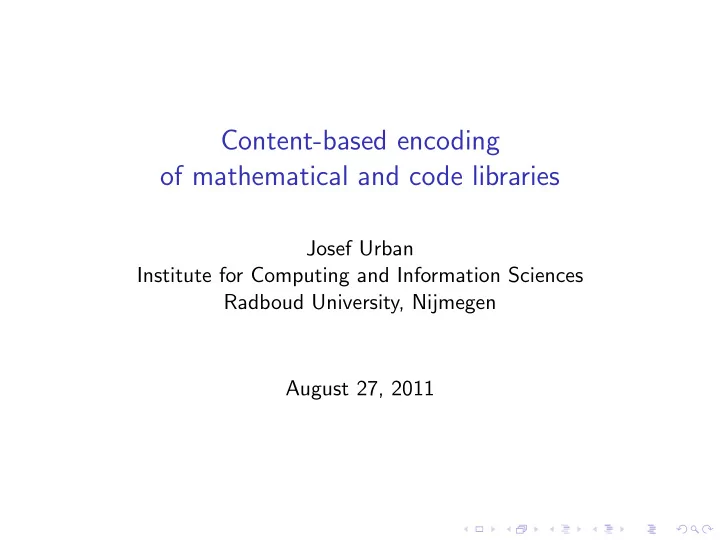

Content-based encoding of mathematical and code libraries Josef Urban Institute for Computing and Information Sciences Radboud University, Nijmegen August 27, 2011
Overview ◮ Introduction: Formal math libraries and wikis ◮ Motivation: naming problems and their implications ◮ Content-based naming methods ◮ Proposed usage in math libraries ◮ Limitations and extensions ◮ Feedback is appreciated!
Introduction: Formal math libraries and wikis ◮ Mathematics can be expressed fully formally ◮ This allows detailed computer understanding ◮ Similar to code libraries ◮ Proof verification (analogous to code compilation) is then possible ◮ Strong computer assistance possible: automated reasoning, semantic search ◮ Large formal libraries arise, similar to code libraries: Mizar, Coq, Isabelle, HOL ◮ Some problems very similar to software libraries management ◮ Actually, we do not know a crisp boundary between code and formal math (Prolog is clearly both)
Motivation: naming problems and their implications ◮ Bolzano-Weierstrass theorem or just Weierstrass theorem? ◮ Solomonoff vs. Kolmogorov vs. Chaitin complexity vs. algorithmic entropy? ◮ In a formal library: relation composition(R,S) or compose(R,S) or R*S ? ◮ many more (additive vs multiplicative groups, operations on all kinds of numbers ... )
Motivation: naming problems and their implications ◮ Renaming: Weierstrass gets renamed to Bolzano-Weierstrass ◮ Moving: CoRN.algebra.Basics.iterateN becomes CoRN.utilities.iterateN . ◮ Merging: Chaitin complexity and Kolmogorov complexity are found to be the same thing ◮ All these operations cause syntactic change of the depending proofs and theorems
Motivation: naming problems and their implications ◮ However, the changes are purely syntactic, there is no semantic difference ◮ How do we align two different concepts spaces with each other? ◮ How do we use various searching and automated reasoning tools modulo the different syntactic concept hierarchies? ◮ One use-case: a new user comes with his own vocabulary and does not know the concepts in a large library
Current naming methods ◮ serial numbering of theorems in textbooks and in Mizar: CARD 1:def 1 ◮ module-based paths in Coq: CoRN.algebra.Basics.iterateN or CoRN.utilities.iterateN ◮ possibly somewhat more descriptive names: commutativity of plus ◮ name mangling: types of arguments added explicitly to the name ◮ none of these are strictly depending on the semantics (contents) of the items
Content-based naming methods ◮ G¨ odel numbering ◮ Recursive term sharing ◮ Recursive cryptographic hashing
Content-based naming methods: G¨ odel numbering ◮ basic logic objects are assigned natural numbers ◮ complicated objects are modelled from less complicated as sequences ◮ a one-to-one encoding of finite sequences to numbers ◮ thus, every mathematical object is uniquelly assigned (a very large) number based purely on its contents ◮ this gives us (theoretically) purely content-based indentifiers ◮ however, this does not seem to be practically usable, the numbers will be very large
Content-based naming methods: Recursive term sharing ◮ automated/interactive theorem provers (ATPs), Prolog ◮ exhaustive sharing of terms is used to achieve space/time efficiency ◮ example: f(g(a)), g(g(a)) is represented as: ◮ a -> *0, g(*0) -> *1, f(*1) -> *2, g(*1) -> *3 ◮ difference to G¨ odel numbering: objects are numbered serially as they come ◮ this makes this scheme fragile ◮ in some sense, not perfectly content-based, depending also on ordering
Content-based naming methods: Recursive cryptographic hashing ◮ G¨ odel numbering results in impractically large identifiers ◮ Recursive term sharing too fragile ◮ Is there something usable? ◮ Minimal perfect hashing? Not really feasible for math objects ◮ Cryptographic hashing! SHA1 SHA256 used in git ◮ Conflicts are extremely unlikely ◮ SHA1 results in 40-character identifiers - this is feasible!
Content-based naming of formal mathematics ◮ The initial library items get an SHA1 value (e.g. their SHA1 value as strings, etc.) that does not change between the library versions ◮ A suitable semantic form (XML) is defined for terms, formulas, etc. ◮ The SHA1 of the semantic form (tree, DAG of items - SHA1 values) is used as the content-based identifier ◮ This is very similar to the way how git recursively computes fie/directory names
Proposed use ◮ See how much naming-based duplication is inside the libraries ◮ Multiplicative vs. additive versions of algebraic structures ◮ Tracking the items’ histories during wiki-like refactoring: ◮ Where were items moved, how were they renamed (semantic diff) ◮ Name-independent automated reasoning/search tools over the libraries: ◮ Should be useful particularly for new users that do not know the canonical concept names
Limitations and extensions ◮ Wikipedia article typically keeps its name for long time, even though its content changes ◮ This gives rise to an equivalence class of SHA1 hashes ◮ Such equivalence classes need to be propagated using some kind of congruence closure algorithm ◮ Semiformal libraries: take SHA1 only of the formal content (skip the comments) ◮ Interesting issue is normalization: ◮ Alternative versions of associative-commutative operations should be normalized into the same semantic form before the SHA1 is computed
Recommend
More recommend